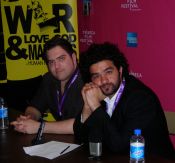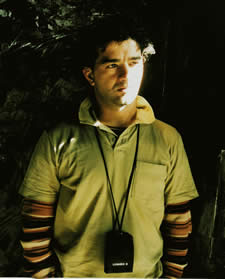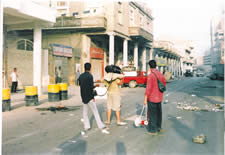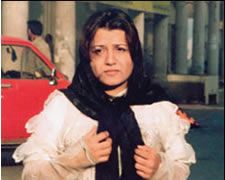
Producer Danny Evans and director Mohamed Al-Daradji
Q: When did you decide to produce the documentary to accompany the film? Having seen the film, Ahlaam, first, it feels as though it fills in the gaps in the film. How did it come about, since you seem to be shooting a lot of footage right from the start?
Mohamed Al-Daradji: When I was heading to Baghdad from the UK, in 2004, I was thinking that something is going to happen, or there is a commentary film behind the fiction film that I was going to make in Iraq. So since I left Leeds, I started shooting my journey to Iraq and the process of making the film. And after I came back from Iraq - that was in 2005 - when I finished shooting the fiction film, I had about 75 hours of footage. At this time I didn't talk about making the commentary, because I was to tired to make anything. I was just about to finish the fiction film and to see the result - it premiered in Rotterdam Film Festival in January 2006.
After that, in 2006 and 2007, there were a lot of things that happened in Iraq, I call them the black years of Iraq history. It was not civil war but it was sectarian violence. I was touring with the film around the world - Tokyo, China, New York, Sweden, India - and I was always hearing "Iraq, Iraq, Iraq". If I was on the ground, I hear "Iraq", if I'm on a plane I hear "Iraq", with normal audiences, they came and cried about Iraq. So I was also crying inside. So [I thought], I need to make this documentary, I need to tell the story about not me, but about the Iraqi people, through me. It was, for me, psychologically, the therapy I needed to go through after the experience I had with Ahlaam and instead of going to therapy and a doctor I decided that film, cinema can help me with that. And fortunately it took me one year between 2007 until January 2008 to finish this documentary with Danny.
Q: How different was it to get people involved with your fiction feature as opposed to getting people involved with your documentary?
 |
Q: What risk do the actors and the crew put themselves in, in terms of the insurgency, by working with you - an Iraqi but coming from Holland. How did you deal with the risk that they might feel? We saw in the film how the American soldiers were a risk but I wondered more about the insurgency.
MA: Basically, when you make a film in Iraq, you need to be a good liar. So my cast and crew, they know I am based in UK and Iraq, they know I studied in Holland, they know I have a production company in the UK. But for the normal audience, the public people, we always lie. We say we are students, making a student film, and we are making a love story. It is nothing to do with politics, nothing to do with the war, it's nothing to do with the insurgency, the Americans, with Saddam, what happened with the Iraqi people during Saddam's regime... it's just a love story - two Arabic people in love, like Romeo And Juliet, that kind of thing. It worked. All the crew and cast were Iraqi and lived in Baghdad and the surrounding area. We had difficulties sometimes when we came to areas dominated by the insurgents.
We try to always keep 'low level'. I know from my main character in Ahlaam film (Bashir - he was in Abu Ghraib prison during Saddam's regime) he is a renowned journalist in his area. After we finished the film he fled from his area and went to a new area because it was too risky for him. Because the insurgents knew he was a journalist and was writing in the newspaper and that he has done some acting. Ahlaam, the actor herself, she also left the area where she was because the area where she was because in 2006 it really was very dangerous in her area because of the insurgents, al-Qaeda. It was not easy for the Iraqi army or American army to enter this area, called the Aldora area and she also went to another area in Baghdad. It was risky but sometimes it wasn't risky because they were working with me. Because we were part of the cultural society in Baghdad. My art designer was killed by the insurgents, because you can see in his ID that he is artistic and artistic is sometimes not welcomed by the insurgents.
Q: The most disrupted me in the documentary was really how the post-traumatic stress is so prevalent. Here we talk about our American soldiers but we certainly don't talk about the Iraqis. We met one person in your film and heard his story but how prevalent was that situation?
 |
For me, after I experienced kidnapping and being put in prison, for me it was [when I saw] any person walking in the street [I thought] he's going to kidnap me, he's going to kill me. Before that I was a guy who thought I could throw myself into any dangers, I didn't care because psychologically I had prepared myself for anything happening because I was saying 'death is very close to me'. In Arabic we call it Azrael - the angel of death - and I imagine myself as though Azrael is flying around Baghdad and he could at any moment come and take you. That kind of psychological preparation helped me to go in any dangerous place and shoot my film. But after the event that happened to me, I thought, you know what, Azrael exists very well, it's not just in the artistic mind. I ended up, after the experience, very scared, I didn't want to go outside my home. It also affected my family - my mum got very sick because of this. But because of my crew and cast and because of my own speech that I was making to them before we started - "We need to rebuild Iraq, we need to make something for ourselves and our future, we cannot give up we cannot let the insurgents, al-Qaeda, the Americans do what they need to do, we need to do it ourselves" - and they came back to me and tell me these words. They keep saying it to me.
Q: When you were shooting Ahlaam and the documentary, it seemed to me that what was really important for you was to focus on the people of Iraq and not to get drawn into the political agenda. How important was it for you to try not to be very political?
MA: That's a very good question. It is not easy not to be involved in the politics of Iraq, it is very difficult because politics is related to you. It's not like here or in the UK when you can deal with politics and go to vote or have some sort of demonstration against the war or against the tax or something like that. In Iraq it's very important for you to be involved in the politics, because it is affecting your daily life. As a person I am involved in the politics, because I'm dealing with it every day.
But as a filmmaker trying to make a film it was for me a fight, I didn't want to be involved in the politics. I didn't want to make a propoganda film - anti-America or anti-al-Qaeda or anything. I would like to just be a filmmaker and tell the human story of the Iraqi people. And that was a fight for myself to stay in this line. When I went through both films and sometimes I discussed with Danny and said is this documentary anti-American, and he said 'no'. I said, 'Okay, is this film anti-new Iraq government', he said 'no'. When I bring some people in to review the film, to help me and to give me some advice, that was one of the first questions I asked. Because from the daily news and events that happen in Iraq and when I go and look to the news and speak with my family, sometimes it scares me that I will be involved in politics of making films without realising it. But I always try to control myself and I think in both films, I see that that was really successful.
Q: Do you really think an artist can not be involved in the political world?
MA: I can talk with you now about politics but in a different way. I do not necessarily need to shout and say I am disagreeing with this administration and what the Americans are doing in Iraq. But, if I give you an example, about what happened with my family that happened in Iraq, I'm talking about the human side of Iraq, then you will think for yourself, that is a very wrong decision that we made for the war in Iraq. That's an example. From a filmmaking point of view, I do not want to make a film with a political statement, propaganda or saying, 'this is wrong, this is wrong'. I need to show you, I need to let you deal with the human side and from that the politics will show a part.
Q: What role do you feel filmmaking and cinema can play in framing people's thought process about Iraq. In enlightening them in solving the troubles there?
 |
In Iraq I think films can help. If we show them the right films. I think one of the examples is Ahlaam. When I showed it in April in 2007, people were crying. This is the first film that can talk about Saddam, because we didn't have any films that said anything about Saddam or about the war in 2003. Because when people see how terrible the regime was, people cry, people relate. It is an example, if I get you to the magic eye of cinema and I get you to the dark room and I show you the violence that can happen to your family and I make you sort of stand in front of the violence that happens around you, I think you're going to rethink and analyse and think, 'why am I part of this?' So cinema can help you to do that.
Q: You've made now a fiction feature and a documentary, is there a difference in the effect they can have in what you're able to express in each genre?
MA: In fiction, you have limited footage, limited set up. In a documentary there is a certain freedom. For me, I felt I could use both of them to tell my story. As a filmmaker I wish to do more with fiction but my way with fiction is to make it very realistic and to let people understand. When audiences see Ahlaam, they ask me how much archive footage did you use. I said, 'none'. I would like to go with fiction but sometimes documentary can help me tell the story. At th end of the day we need just to tell the story, it's not about fiction or documentary. For my creative side, I like to light the scene to shoot in 35mm.
Q: When you see the film, how do you feel emotionally? Do you relive memories?
MA: It is very difficult and very tough to watch both films. I mean, I've watch Ahlaam about a million times, I watch it wherever I go. I got to see it with the audiences. I don't look to the screen, I look to the faces of the people and try to learn how they react to the film. For me, when I watch both films it is too emotional because there is a memory in it. It is not just a memory of a film, it is a memory of time, human beings, friends, relations, love, God, madness, war everything. Both films are really touchy for me. I try to work hard with myself to not be too emotional with them, to say, this is a film and leave it to the audience.
Q: How do you feel about going back to Iraq now you have more notoriety, now the lies may not work as well?
MA: I just came two weeks ago from Iraq. I tried to get to my home but I couldn't because it was too dangerous. I was going to see my family and preparing to shoot my next film. I was sitting in a cafe and smoking Sisha - a water pipe - and it was nice weather and the smell of the trees and I was thinking, "My God, this is beautiful". Then the sirens came and disturbed all this beautiful image in my head. And I told myself: "What are you doing here? Why don't you go back to Europe and live in peace and get married and have children and make commercial films and do some films in Europe. You could do that there."
Q: You got such a great look in Ahlaam. How did you achieve that?
A: I shot Ahlaam in 35mm, with just basic lighting - one light always. Because I learned cinematography from old paintings. Like in the church and look at the story behind the paintings and try to shoot it in my films. It helped me with the story to shoot it in a mystic style and give the look.
Q: You move from pastel colours and it becomes increasingly grey?
I wanted to keep the colour alive for the characters at first but then kill the colour when the characters faced the war. Because when you have sunshine in the war it is always killed by the smoke of the war.
Q: When you see other films about Iraq, do you feel critical? Do you get worked up?
MA: Sometimes it hurts me a lot when I see it. Of course, there is something about each film. When you make a film about Iraq it is from your perspective, your point of view. I do respect that. If Fahrenheit 9/11 uses Iraq in a certain way, this is how Michael Moore views and uses Iraq for his message that he tried to send. But a lot of films do not show the Iraq side of the story. My next film is about a Kurdish mother who comes from northern Iraq with her grandson of 12 years old, coming to the south of Iraq two weeks after the fall of Saddam in 2003, looking for her son who has been missing since 1991.
At the same time I am telling the story of the son and how he has been missing since the Gulf War and how he was captured and put in prison. So the two stories come together and mix with each other. And then we end it in a mass grave and the suffering of the Iraqi people left by the Saddam regime. If I am selfish and just want to make it from my point of view... I am an Arabic Iraqi and could make it about an Arabic woman coming from Baghdad or from the south or from the east. What am I doing with the Kurdish? I don't understand their language. That is one of the questions. But I said, no, I like to have the challenge. I like to take people whose language I don't understand and try to understand their language and how they look at Iraq and try to tell their story because they are human beings.
So this is one of the things that hurts me with some filmmakers when they tell the story or have access to go to Iraq and be with the Iraqi people. You make a film about Iraqi people, but it is not about the Iraqi people, it is not about shooting the footage, it is about editing the footage from their [the filmmaker's] point of view.
I think a good example is Iraq In Fragments. For me, personally, he had very good access and he was in Iraq at the same time I was shooting the film. I met him at a festival and we discussed it. He's a great filmmaker, he has very great cinematography and it's an amazing film he made artistically. But to make Iraq In Fragments and to decide to turn Iraq into three parts. We are in a time that we need to have Iraqis united. We need to not have this that the media creates - Sunni, Shia and Kurd - this is some of the journalists and media and the policy behind Iraq is to divide it into groups of religion, from Muslim or Christian or Sunni or Shia or Kurd or Turqeman.
As a filmmaker we need to say this is not about a Sunni or a Shia or a Kurd, it is about a human being. We need to help them and unite them and give them some hope - not to divide them. This is one of the thing that makes me sad. I like the film artistically. But to divide the nation, to make three sections it will not help the Iraqi people and it will give a message to the audience that it will not be easy for Iraq to be united.
 |
She studied in theatre school in Baghdad. She did theatre and hadn't been on film. It was difficult for her because she has a baby of one and a half years old and had to care for him. It was very difficult to get her to the role. First of all she rejected. But I said to her, "Just read it, just read the script. Don't talk about it yet." I started to shoot the film and I was really thinking I'm not going to make it about Ahlaam but about Halim and turn the character from female to male. But then when she read it, she said: "We need to talk, come to my home." So I went to her home and her husband was there and she said, "Okay I would like to do this role because I really like it. But there are three conditions. I need to have my husband play the rapist in the film." I accepted that. She said: "I need to rewrite, with you, the script [the rape scene]." I said let me think about it. Then the third condition was about her baby, that she needed her baby with her wherever we went.
I'm thinking, how can we take the baby when on the streets of Baghdad there is battlefield. We should care about how to protect our camera not how to protect a baby and she said: "No." She is scared to leave the baby at home. During the shooting we ended up a lot of time having a break not because of the insurgency or needing to eat but because he is needing milk or to sleep or because he is crying and she can't act while he's crying.
But the funny thing about the rape scene was that she rewrote it with me and said: "Okay, that's fine, but we need to make a contract for $8million" - imagine, the production started with a sum of $10,000 - and she said: "We need to write a contract for $8million with eight witnesses. If you change anything in the rape scene we will take you to the court for it." So when I was editing Ahlaam, I was looking to the contract, then looking to the scene. And sometimes someone would say, "We need to use this scene". I'd say "No, we don't, because we'd need to pay $8 million and I don't have that." But it is symbolic. It was difficult to get her and it was very sensitive to shoot that scene. She cried afterwards because she could imagine the situation of the woman who had been raped and also the symbol of the rape in Iraq. So it was difficult.
Q: So she hasn't sued you yet?
MA: No she is very proud of the film. She presents with me in Baghdad. After this film she is now very successful and made a TV drama.
Q: Do you have any interest in making a film in Europe about people from Iraq and other Arabic cultures living in Europe?
MA: Yes, to be honest with you and I do have those kinds of ideas and I'm writing them now about immigration. But first I need to tell the story of the Iraqi people. We need to tell some of the stories.





















